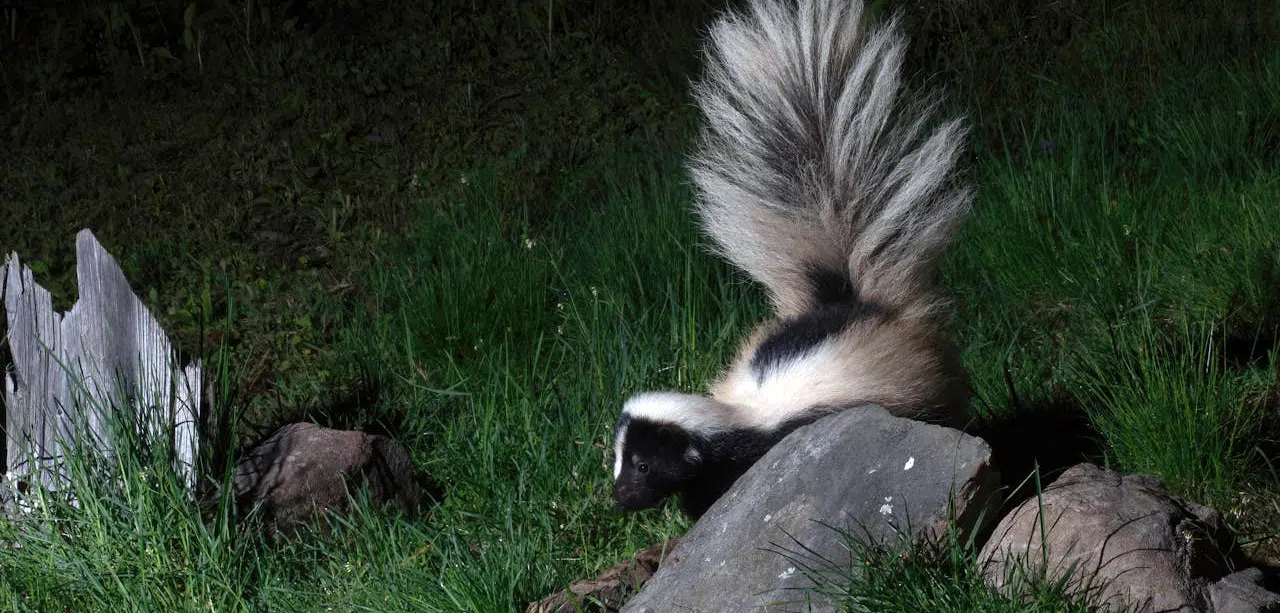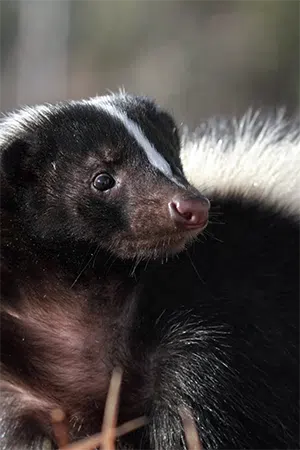So, you step outside on a beautiful summer morning, coffee in hand, slippers on feet, and discover your prized lawn looking like a battlefield. Your meticulous yard got torn up into little clumps and your spring bulbs were dug up to boot... you may well be looking at the aftermath of a hunting and gathering expedition led by an industrious skunk. Let's see what can be done about putting a stop to this, shall we?

Why Skunks Dig Up Lawns
It's disheartening, for sure, to find your yard in such a state and we will get to how you can stop a skunk from digging up your lawn. But first, let's look at the motivations behind this late night assault.
 Foraging for Grubs and Insects
Foraging for Grubs and Insects
Skunks are creatures of the night - nocturnal, that is, not vampires - and so are one of their main staple foods: grubs. Because skunks have pretty poor eyesight and vision care is hard to come by, their acute sense of smell (how ironic is that!?) is what helps them locate grubs and insects beneath your grass. They are prolific diggers and quite skilled at unearthing those tasty treats.
Hunting for Earthworms & Seeking Out Larvae
Earthworms, various larvae, and even some bees are also on your resident skunk's menu. And, of course, they also live below ground and require the use of sharp claws to be harvested.
Creating Den Sites
If you find the main excavation efforts are not in the middle of your lawn but rather near structures like your porch or shed, it may indicate an entirely different reason for the all-nighter. A young expectant mother may be feeling the urge to nest and create a cozy home for the soon-to-arrive family additions.
Marking Territory
While not directly related to digging, once your skunk has evaluated your yard and found it to be pleasant and plentiful, he or she may be leaving little bits of spray here and there to proclaim your yard occupied territory. In this case, of course, there is no guess work needed to determine what type of critter has been launching warfare on your beloved lawn and garden.
Natural Deterrents for Skunks: How to Stop Skunks From Digging Up Lawn
Remember how skunks have this highly evolved sense of smell? You can use this to your advantage. You may not be able to eliminate the tempting aroma of grubs and worms and beetles, but you can certainly throw in some scents that are anything but delightful - from a skunk's perspective. Let's explore natural skunk repellents in more detail:
 Citrus Peels
Citrus Peels
Citrus peels, citrus oils, anything citrus, really - not a favorite for madam skunk. Scatter orange or lemon peels where you've observed damage. The great thing about these is that they won't hurt pets or humans.
Coffee Grounds
Your morning cup of coffee in not done yet - sprinkle the coffee grounds around your yard, garden, and around your deck or porch (or anywhere else you could imagine a skunk may want to take up residence). You may have to save up a couple days worth of coffee grounds to end up with a sufficient amount; create a thick layer that will stay in place and give off a strong scent. Caution: Caffeine is toxic to pets! Only use coffee grounds if there is no danger of a cat or dog consuming it.
Predator Urine
Speaking of dogs: Your dog doing its 'business' in your yard may very well help keep smaller wildlife at bay. But, if that's not enough, you can purchase predator urine (how weird is that!?) - you'll probably want to go with coyote urine.
 Peppermint Oil
Peppermint Oil
Peppermint! Many critters don't like peppermint - neither the plant nor the oil. A few drops of pepperment oil in strategic locations can be quite effective. Lawn protection from skunks could include planting mint and enjoying a lovely cup of tea in the evening. Fair warning, though... peppermint grows like nobody's business and can take over a bed in no time at all.
Mothballs
Ew. Mothballs smell gross, even for less sensitive creatures like us. If you can stand the punishement on your own senses, mothballs could make one of the more effective skunk repellents. Caution: Mothballs are also toxic to our pets.
When to Call for Help
When everything above plus the 'Keep Out!' sign has failed, it may be time to seek professional help. A skunk or skunk family on your property can put a real damper on warm summer nights on the patio.
Persistent Intrusions
Once your yard has been deemed bountiful, it may also earn the 'home' designation. This means, Mister or Madam skunk will either take up full time residence in a spot you haven't found yet, or return for the nightly buffet your lovely backyard so conveniently offers. By this time, a bit of oil here or some citrus peels there won't deter them.
Property Damage
We talked about skunks being skilled excavators, but did you know that they're also pretty good at chewing through materials like wood or vinyl siding? Where there's a will, they'll make a way - or something along those lines. Closely inspect areas around your deck, porch, and any garden sheds. If you find actual break-in attempts, it's time to call in reinforcements.
Health and Safety Concerns
As with all wildlife, there is always a concern for the health of your family and pets. In the case of skunks, those concerns are mostly around rabies and leptospirosis. The skunk is one of four species of wildlife (including the fox, raccoon and bat) classified as a rabies vector species. A rabies infection is almost always fatal for humans.
Get Lawn Protection From Skunks: Call Hawkeye for Skunk Control
If possible, we all seek solutions that won't hurt or disrupt wildlife's life, breeding, or territory. And as such, making your yard less attractive, is the first and often successful suggestion to 'move along' for skunks, raccoons, or other wildlife hanging around your home. But when those suggestions fail, it's time to look at actually evicting the animal(s). In order to stop skunks from digging up your lawn, they may have to be removed from your property by a certified Wildlife Control and Removal service.
Hawkeye Bird & Animal Control is a leader in humane skunk trapping, among other skunk control and removal methods. Contact Hawkeye today for a free estimate and assessment. We're here to help!














